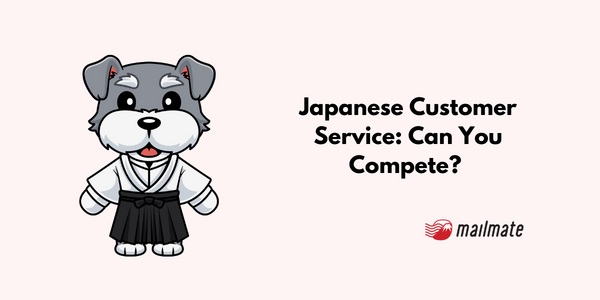Japanese Customer Service: Can You Compete?

What does the average Japanese customer care about when interacting with your business? Are there cultural differences you should be aware of?
Certain rules of customer service are universal. Listening and empathizing are basics in the customer care profession. Yet, differences across cultures could land you in a tight spot if you aren't aware of the subtleties.
So what customer service expectations exist in Japan? And what methods should your business consider implementing to boost loyalty and capture more leads from Japanese customers?
Here are 3 key strategies—backed by data—that will help you maximize customer service experience and minimize bad customer service due to not understanding key elements of Japanese culture.
Strategy #1. Apologies
A paper from Osaka Prefecture University highlighted the primary differences in how American and Japanese customer service professionals handle complaints, based on a survey of over 300 respondents from each country.

The data revealed Japanese service professionals would apologize and explain the cause of the problem at a higher rate (26.8%) than their American counterparts (15.5%).
Japanese customer service professionals emphasize garnering customer understanding by apologizing properly (JPN 78.5%; US 51.8%), while American customer service professionals focus on making the customer happy by offering practical solutions in the form of cash or gifts (US 17.1%; JPN 2.2%) or insurance for injuries (US 44.2%; JPN 15.1%).
Other notable points from the study include the following:
US customer service professionals accommodate customer requests in a casual and friendly way, treating customers like old acquaintances, with the primary focus on customer happiness and satisfaction.
In Japan, customer happiness is vital. But formalities and doing things the “correct” way are equally crucial, such as respecting distance, using honorific terms, and being quick to apologize.
Foreign business owners and foreign visitors are often puzzled over the Japanese way of apologizing so readily and profusely at every turn. As a business owner looking to bring your company to Japan, you may balk at the idea of doing so yourself.
This points to an underlying cultural difference of what a verbal apology entails. In the US and other countries, apologizing is close to admitting fault, which could spark demands for compensation.
In contrast, although Japanese people value apologizing, doing so does not necessarily lead to taking some form of responsibility for an action. In other words, an apology is considered a formality and a stepping stone for moving forward in Japan.
In fact, apologies are such a cultural cornerstone that today there are service provider businesses in Japan (e.g., Shazaiya.com) you can hire who will apologize on your behalf if you have made a gross misstep.
For the business owner intent on offering a five-star customer experience, have a set of beautifully crafted standard apologies at the ready, and don't be stingy in giving them.
Strategy #2. Speedy responses
In a previous article, we touched on the main source of customer dissatisfaction: long wait times. But how long is too long for the impatient Japanese customer?
PR TIMES issued survey results on the theme of “Relation between customer satisfaction and inquiry form response time” (trans. title).
This survey gathered answers from 853 male and female respondents, ages ranging from 15- to 84-years-old. Although this survey's sole focus was on replying quickly to inquiry forms, the results are telling of the Japanese consumer's expectations of customer service in general.

Responses revealed 70.5% of the respondents would not wait longer than 24 hours for a reply to address customer needs. Therefore, making customers wait for longer than 24 hours will likely lead to a bad service experience.
Further questions revealed the response time that feels fast: 49.8% would consider a response taking up to an hour as a speedy response.
In other words, an hour is the benchmark for customers waiting for a response, after which they will start feeling impatient. Implement strategies that will help you achieve this time frame.
Strategy #3. Business etiquette and honorific terms
Knowledge of business manners in Japan can help you avoid embarrassment and gain trust from customers and business partners.
On the other hand, ignorance of business etiquette can lead to offending the other person and lowering the image of your business, service, or product. Even one bad service experience can turn off potential customers for good.
Unfortunately, mastering Japanese business etiquette is challenging, evidenced by this survey of 500 respondents conducted by BizHits, showing that many Japanese don't feel confident in their business manners and use of honorific terms (keigo).

BizHits, a company offering tips and advice for business problems, revealed that 40.4% of the Japanese respondents were not so confident in their business etiquette, and 9.8% said they are not confident at all.
Furthermore, 28% of the respondents said they embarrassed themselves in the past for lack of knowledge of business manners. Some examples given were the following:
I messed up trying to use an honorific term.
I felt stupid not knowing who should offer the business card first.
I sat where the most important person should sit out of ignorance of seating arrangements.
From convenience stores to courteous clerks, employees, and waiting staff who provide service for your dining experience, it remains a necessity to use honorific terms, tone, and the correct opening and closing phrases.
Frequently asked questions
What is unique about Japanese customer service?
Japanese customer service, aka "Omotenashi", is renowned worldwide for its high standards, which places importance on putting oneself in the others' shoes.
How does Japanese customer service differ from Western customer service?
One of the main ways Japanese customer service differs from Western customer service in that it focuses on apologies as a way forward. Whereas Western customer service will often shy away from apologies as they are seen as an admission of guilt.
How important is politeness in Japanese customer service?
Being polite and showing respect through the use of honorific language is a mainstay element of Japanese customer service.
Is Japanese customer service considered the best in the world?
While it can depend on individual preferences, Japanese customer service is often considered among the best in the world.
What challenges might I face when implementing Japanese customer service practices in my business?
Implementing Japanese customer service practices can involve significant cultural and operational changes. Language barriers, differences in etiquette, and the need for rigorous staff training are among the challenges that businesses may face.
In closing
Even Japanese have trouble with using the right honorific terms in business emails, phone calls, and interactions.
If you are bringing your business to Japan, consider outsourcing your client follow-up to customer service professionals to build solid customer relationships and capture more leads in Japan.
Spending too long figuring out your Japanese mail?
Virtual mail + translation services start at 3800 per month. 30-day money-back guarantee.

